Why is billionaire George Soros a bogeyman for the hard right?
- Published
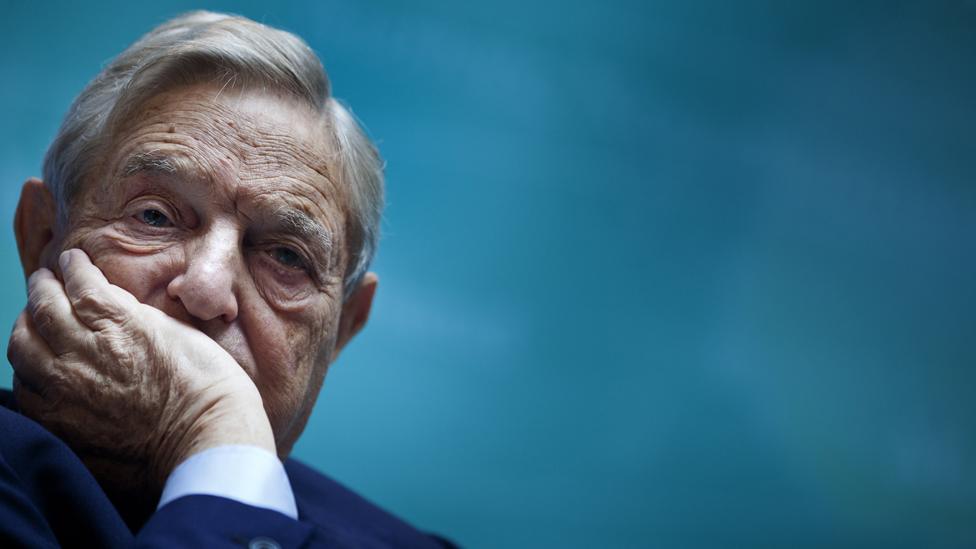
He's a Jewish multi-billionaire philanthropist who has given away $32bn. Why does the hard right from America to Australia and from Hungary to Honduras believe George Soros is at the heart of a global conspiracy, asks the BBC's Mike Rudin.
One quiet Monday afternoon last October in leafy upstate New York, a large manila envelope was placed in the mailbox of an exclusive country mansion belonging to multi-billionaire philanthropist George Soros.
The package looked suspicious. The return address was misspelt as "FLORIDS" and the mail had already been delivered earlier that day. The police were called and soon the FBI was on the scene.
Inside the bubble-wrapped envelope was a photograph of Soros, marked with a red "X". Alongside it, a six-inch plastic pipe, a small clock, a battery, wiring and a black powder.
More than a dozen similar packages were sent to the homes of former President Barack Obama, former Secretary of State Hillary Clinton and other prominent Democrats.
None of the devices exploded. The FBI traced the bombs to a white van covered in pro-Trump and anti-Democrat stickers, parked in a supermarket car park in Florida.
Immediately the right-wing media claimed it was a "false-flag" operation intended to derail President Donald Trump and the Republican campaign, just two weeks before the crucial US mid-term elections.
Fox Business host Lou Dobbs tweeted: "Fake News - Fake Bombs. Who could possibly benefit by so much fakery?" Conservative talk radio host Rush Limbaugh added: "Republicans just don't do this kind of thing."
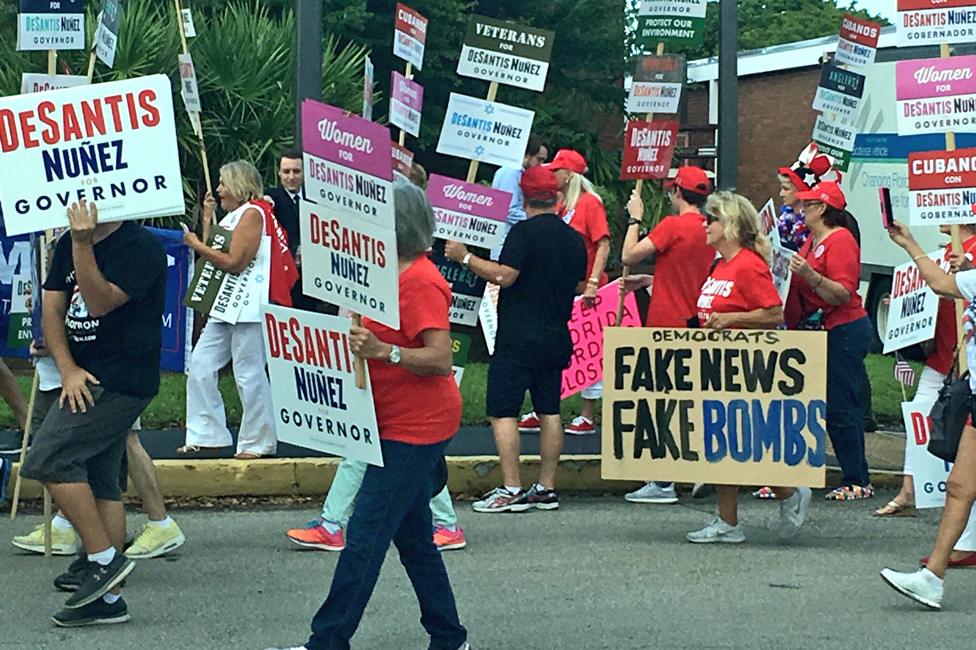
Soon the internet was awash with allegations that the bomb plot was a hoax organised by Soros himself.
President Trump condemned the "despicable acts", but when a member of the audience at a White House reception shouted "Soros! Lock him up!" the president seemed amused.
Then a 56-year-old Florida man called Cesar Sayoc was arrested.
Conspiracy theories claimed he wasn't actually a Republican. But Luigi Marra, a former work colleague, told me how Sayoc used to deliver pizzas in his van plastered with pro-Trump stickers and argue with customers if they had Democratic posters at their homes.
"Everything for him was a conspiracy theory, everything. George Soros was the one behind everything, he was the one buying the whole Democratic Party, he was the epicentre of what is going wrong in the United States of America."
Sayoc's social media revealed more. On the day the pipe bomb was discovered at George Soros's house, Sayoc reposted a meme claiming, "The world is waking up to the horrors of George Soros."
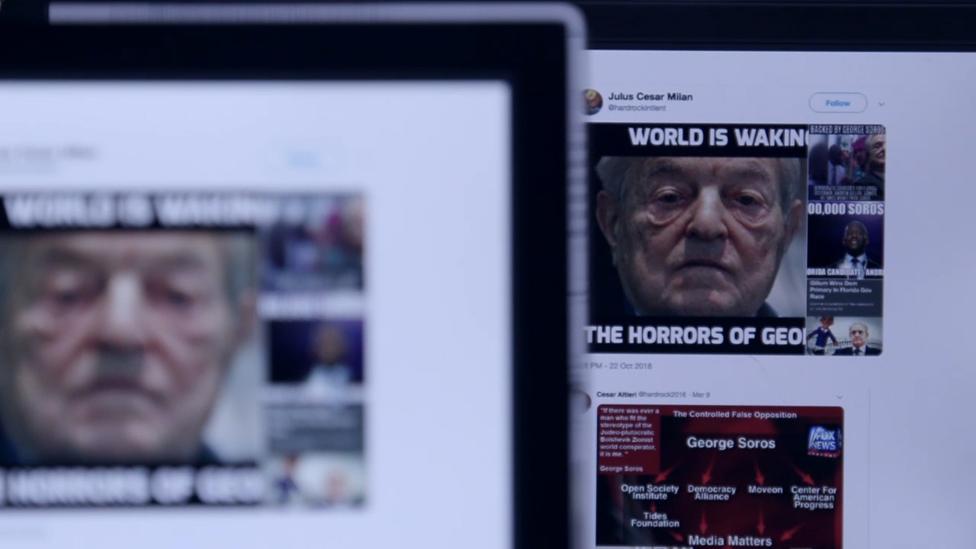
Sayoc later pleaded guilty to 65 counts, including intent to kill or injure with explosives, and was sentenced to 20 years in prison.
So how did George Soros come to be regarded by so many as the evil mastermind at the heart of a global conspiracy?

Find out more
Watch Conspiracy Files: The Billionaire Global Mastermind on BBC Two at 21:00 on Sunday 8 September
Viewers in the UK can catch up later online

In the UK, Soros is known as "the man who broke the Bank of England" in 1992. Along with other currency speculators, he borrowed pounds, and then sold them, helping to drive down the price of sterling on currency markets and ultimately forcing the UK to crash out of the European Exchange Rate Mechanism. In the process he made $1bn.
The Hungarian emigre, who survived the Holocaust and fled the Communists, is thought to have made in total about $44bn through financial speculation. And he's used his fortune to fund thousands of education, health, human rights and democracy projects.
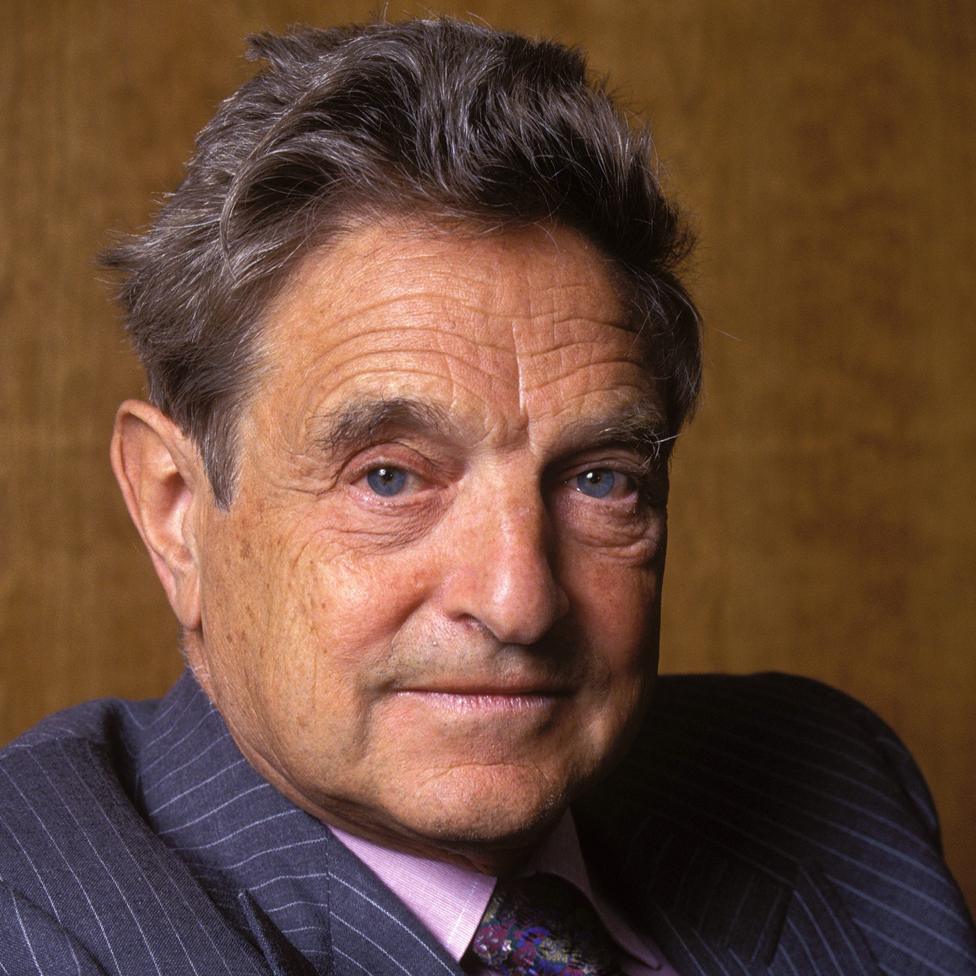
Soros in Moscow in 1993
Established in 1979, his Open Society Foundations now operate in more than 120 countries around the world. But this bold philanthropy in support of liberal, democratic causes has increasingly made him the bogeyman of the right.
The first conspiracy theories about George Soros appeared in the early 1990s, but they really gained traction after he condemned the 2003 Iraq War and started donating millions of dollars to the US Democratic Party. Ever since, American right-wing commentators and politicians have gone after him with increasing fury and vitriol, and often with scant concern for the facts.
But it was Donald Trump's election victory that took the attacks on Soros to a new and dangerous level.

White supremacists marching in Charlottesville
Eight months into Trump's presidency, in August 2017, neo-Nazis held a torchlit procession in Charlottesville, Virginia. Clashes with counter-protesters ended in tragedy, when a white supremacist drove a car into a crowd and killed 32-year-old Heather Heyer.
Among US right-wingers it was soon claimed that the violence was orchestrated and financed by Soros, in order to tarnish the reputation of President Trump. And they said the key to the secret plot was a man called Brennan Gilmore, who filmed the car being driven into the counter-protesters. Right-wing radio host Alex Jones claimed Gilmore was paid $320,000 a year by Soros and was part of a deep-state coup to oust the president.
But any connection was extremely tenuous.
While it's true that Soros gave $500,000 to the political campaign of Tom Perriello - a Democratic candidate for governor of Virginia whom Gilmore had worked for - there's no evidence Soros or the Open Society directed or paid protesters at Charlottesville. Gilmore, who never received any money from Soros, is now suing Alex Jones and several others for defamation.
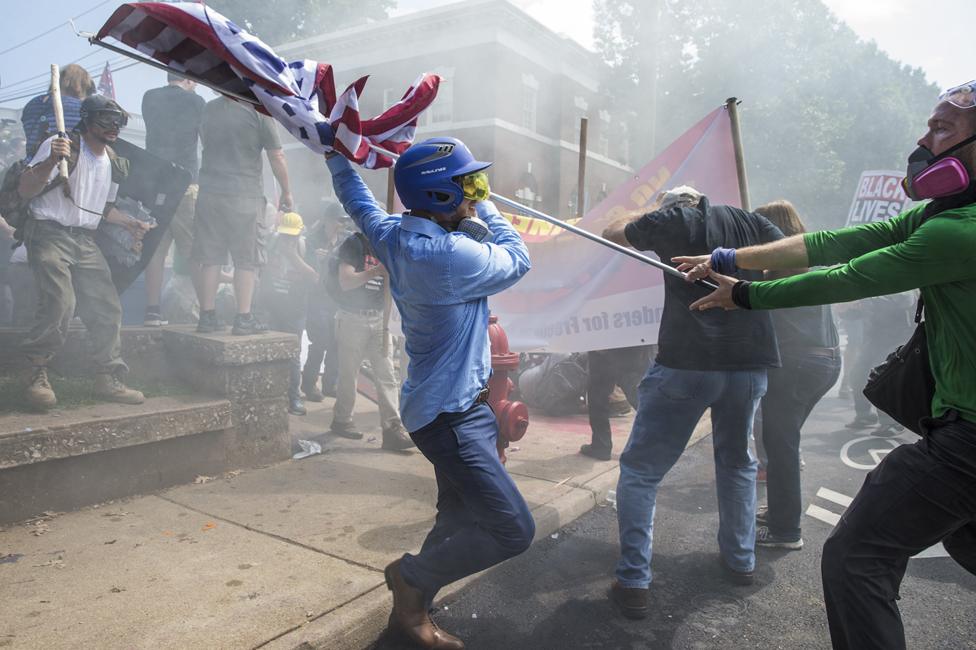
Clashes in Charlottesville
Since then, the attacks on Soros have kept coming, and only intensified.
Last autumn thousands of migrants left Honduras bound for the USA, just a month before the mid-term elections that threatened to weaken Republican control of Congress.
Immediately the so-called migrant caravan was blamed on Soros. Fox News repeatedly broadcast claims that Soros wanted open borders and unrestricted immigration.
Jack Kingston, a former Republican Congressman, told me: "It is a very organised effort and somebody is behind this, somebody is paying for some of this and it would be typical of George Soros to get involved in that."
For his part, President Trump retweeted a video that claimed to show cash being handed out to people in Honduras to "storm the US border", with a suggestion that the cash might have come from Soros.
When asked outside the White House whether Soros was funding the migrant caravan, he replied: "I wouldn't be surprised. A lot of people say yes."
Cindy Jerezano, who travelled with the caravan from her home in Honduras to the US, told me that she was not offered any money and made her own decision to travel nearly 3,000 miles to San Diego.

The migrant caravan crosses from Guatemala into Mexico
Cindy was supported, once she arrived in the US, by the Catholic Charities for the Diocese of San Diego. Nadine Toppozada, the charity's director of refugee and immigrant services, explained that their lawyers interviewed asylum seekers in great detail but had never heard Soros's name mentioned. Nor had they seen any evidence of Soros involvement.
What's more, the video President Trump retweeted quickly turned out to be flawed.
Within hours, journalists discovered the footage was not filmed in Honduras as originally claimed, but in the neighbouring country of Guatemala, and a closer look at the clip showed at least one of the supposed aid workers was armed.
The migrant caravan was filmed throughout its entire journey. Local charities were seen helping the migrants. But there is no evidence of Soros funding at any point.
On 27 October 2018, 11 days after the first conspiracy theory surfaced about the migrant caravan, and five days after the pipe bomb was delivered to Soros's house, a white man armed with an assault rifle and three handguns walked into a synagogue in Pittsburgh. There he murdered 11 Jews.
It was the worst act of anti-Semitic violence in US history - and it was carried out by a man obsessed with George Soros.
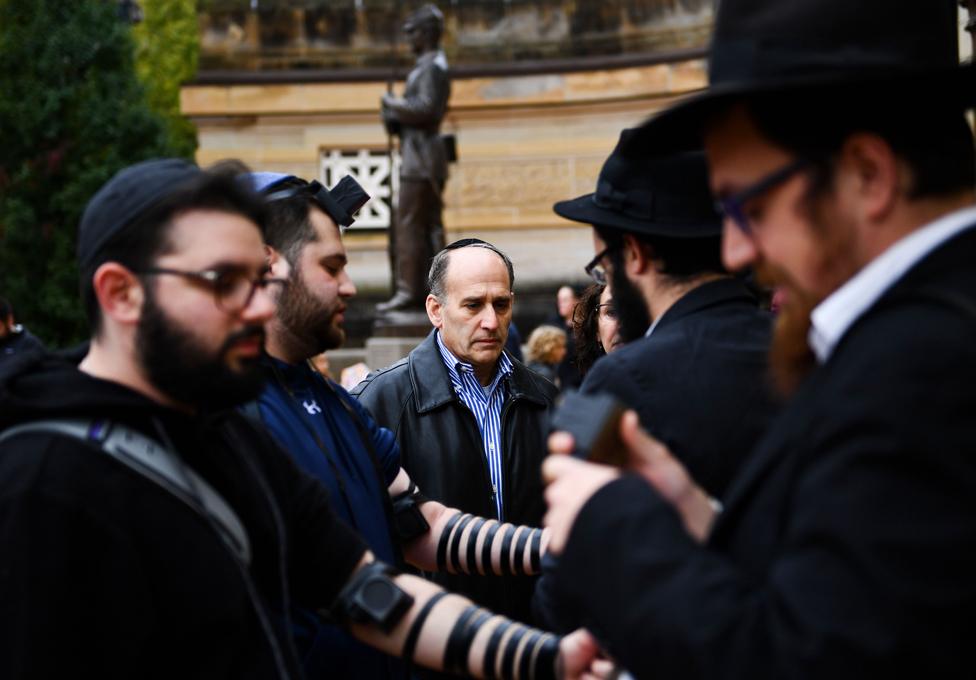
A vigil in memory of the 11 people who died is held at the Tree of Life synagogue in Pittsburgh
The social media posts of the gunman, Robert Bowers, revealed he believed in a dark anti-Semitic conspiracy theory called "white genocide", with Soros as the mastermind.
The theory claims white people are being replaced by immigrants and will ultimately be eliminated. It explains the neo-Nazis' chant, "Jews will not replace us!" as they marched through Charlottesville.
Joel Finkelstein, director of the Network Contagion Research Institute, discovered one post where Bowers referred to Soros as "the Jew that funds white genocide and controls the press", and claimed that he pushed for gun control and open borders.
Finkelstein, who has received Open Society funding to investigate what he believes is a growing threat, concludes that white supremacists like Bowers see Soros as a Jewish mastermind pulling the strings. "These violent actors are justifying their violence by pointing to Soros as a supreme form of evil," he says.
The vilification of George Soros has spread far beyond the US, to Armenia, Australia, Honduras, the Philippines, Russia and many other countries.
Turkish Prime Minister Recep Tayyip Erdogan has accused Soros of being at the heart of a Jewish conspiracy to "divide" and "shatter" Turkey and other nations.
In Italy, former deputy prime minister Matteo Salvini accused him of wanting to fill the country with migrants because "he likes slaves".
The leader of the UK's Brexit Party, Nigel Farage, has claimed Soros is "actively encouraging people… to flood Europe" and "in many ways is the biggest danger to the entire Western World".
But one country, and one government, has gone further than any other to attack Soros. It is his birthplace, Hungary, where he has spent hundreds of millions of dollars funding free school meals, human rights projects and even a new university.
Prime Minister Viktor Orban and his populist nationalist government claim that Soros has a secret plot to flood Hungary with migrants and destroy their nation.
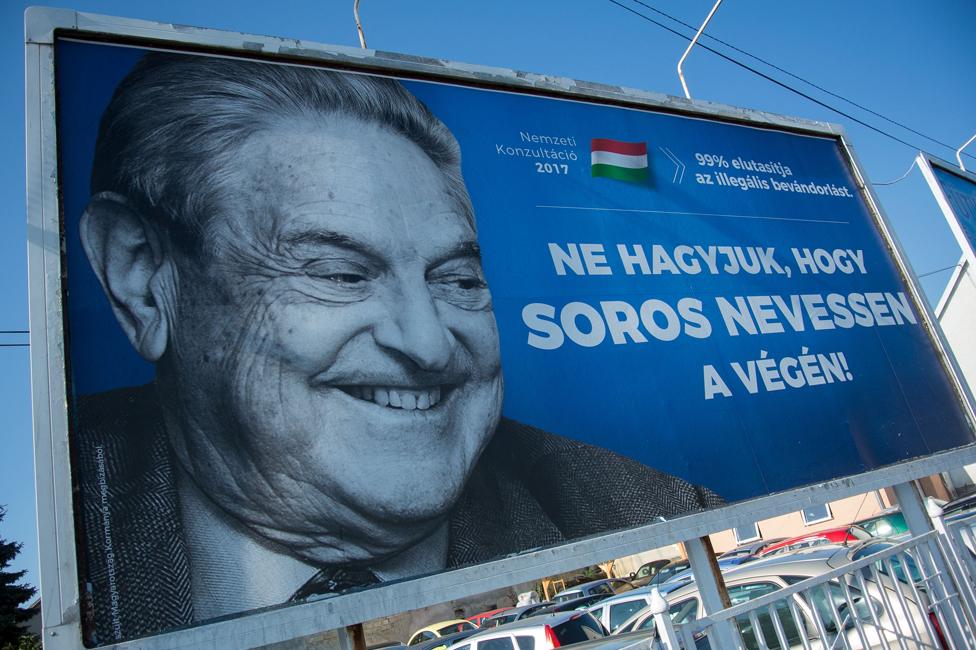
A billboard tells Hungarians not to let Soros "have the last laugh"
Leonard Benardo, vice-president of the Open Society Foundations, protests that this is an outright lie: "The allegation is false. Neither George Soros nor the Open Society Foundations are proponents of open borders."
That hasn't stopped the Hungarian government, which has spent 100m euros on a media campaign warning voters not to let Soros "have the last laugh" and introduced what it calls "Stop Soros" laws, criminalising help for illegal immigrants and taxing support for organisations "promoting migration".
"There's a lot of money going into the Soros empire, billions of dollars for the past couple of decades and years," government spokesman Zoltan Kovacs told me. "Now that's a lot of money, and nobody can be as naïve as to believe that that money goes without weight and goes without any intention."
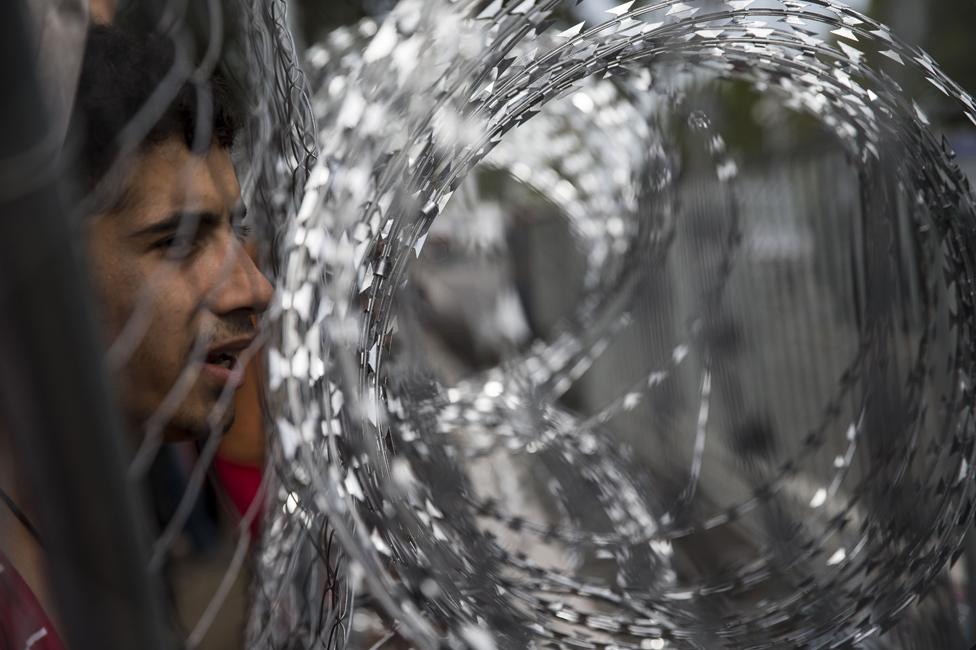
Hungary erected a razorwire border fence in September 2015, halting the entry of migrants
As Michael Ignatieff, the president and rector of the Central European University that Soros founded, puts it: "The Orban government has decided to make Mr Soros public enemy number one".
So how did this happen?
The answer lies in upstate New York.
In 2013, when the Hungarian leader needed advice on getting re-elected, he approached a legendary political consultant, called Arthur Finkelstein (no relation of Joel), who used to work in a small office above a hairdresser's in Irvington, just 20 miles down the road from Soros's country mansion.
Arthur Finkelstein, who died in 2017, worked for Donald Trump, George Bush senior, Ronald Reagan and Richard Nixon and is renowned for making "liberal" a dirty word in politics.
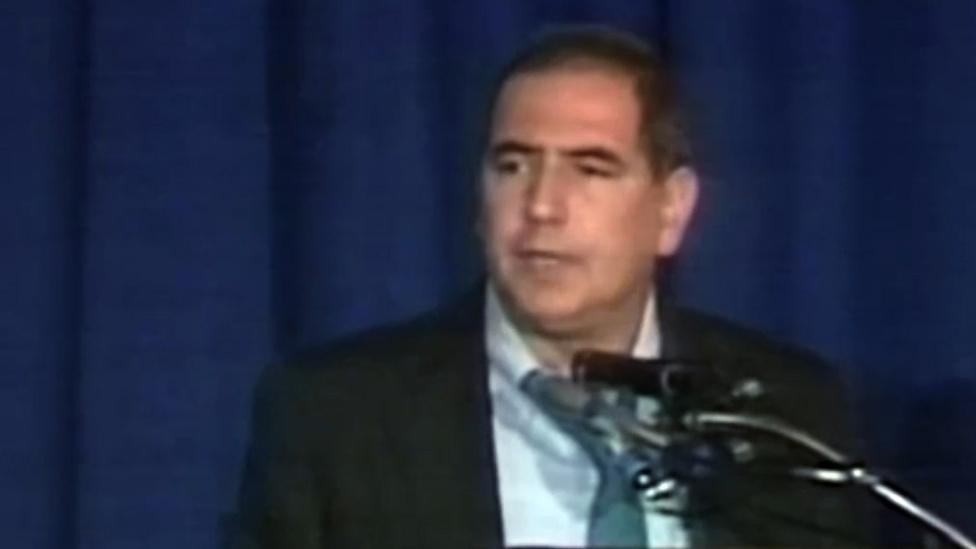
Arthur Finkelstein
Finkelstein created a new style of politics dubbed "Finkel Think", says Hannes Grassegger, a reporter for the Swiss publication, Das Magazin.
"Arthur Finkelstein always said, 'You don't go against the Taliban, you go against Osama Bin Laden.' So it's about personalisation, picking the perfect enemy and then [you] go full on against that person, so that people are actually scared of your opponent. And never talk about your own candidate's policies, they don't matter at all."
Finkelstein realised the best way to get Orban elected was to find a new enemy. He suggested Soros, and it was a perfect choice, Grassegger says. "The very right hated him because he was Jewish, people at the very left hated him because he was a capitalist."
The irony is, Arthur Finkelstein was himself a Jew. "This Jewish gentleman creates this Jewish monster," Grassegger says.
The Hungarian Government denies they needed anyone to "invent" Soros. In a statement it said: "George Soros invented himself as a political actor as long as two decades ago. George Soros's network of institutions exercises a great deal of power without a mandate coming from the people."
But Orban seems to have implemented Finkelstein's advice to the letter and gone even further.
The Conspiracy Files: Why did Hungary’s PM turn on George Soros?
In a speech weeks before the 2018 general election, Orban rounded on Soros and appeared to revive anti-Semitic stereotypes.
"We are fighting an enemy that is different from us. Not open but hiding. Not straightforward but crafty. Not honest but unprincipled. Not national but international. Does not believe in working but speculates with money. Does not have its own homeland but feels it owns the whole world," he said.
Viktor Orban won by a landslide. After the election, the crackdown on Soros-funded organisations intensified. Last May the Open Society closed its office in Hungary.
Michael Ignatieff has battled to keep the Central European University open in Budapest. He is determined to counter what he claims is dangerous propaganda in a country in which more than half a million Jewish Hungarians were exterminated by the Nazis in just two months in 1944.
Ignatieff says the anti-Soros campaign "is a faithful reprise of every single trope of anti-Semitic hatred from the 1930s... The whole thing is a complete fantasy. This is the politics of the 21st Century, if you haven't got an enemy invent one as fast as you can, make him look as powerful as possible and bingo - you mobilise your base and win elections with it."
Prof Deborah Lipstadt, who won a famous legal battle to expose a Holocaust denier in the British courts, is deeply uneasy too.
"It terrifies me that this kind of rhetoric, which used to be heard in beer halls and dark corners, is being spoken by politicians, by leaders of countries, the deputy prime minister of Italy, the prime minister of Hungary. That this kind of language is being used is shocking."
You may also be interested in:
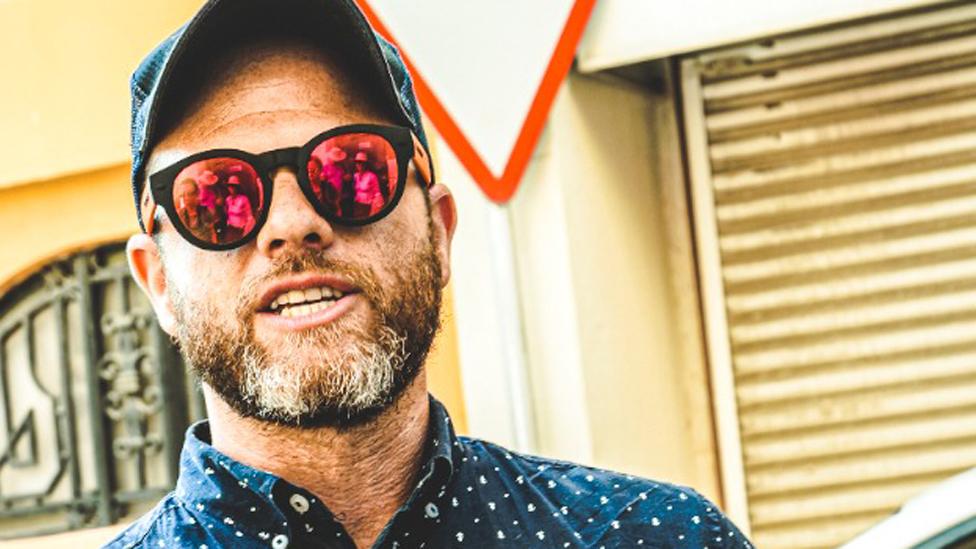
An American who landed in Majorca five years ago soon found himself working to revive the Mediterranean island's Jewish community - with the help of families forced to convert from Judaism to Christianity 500 years ago.